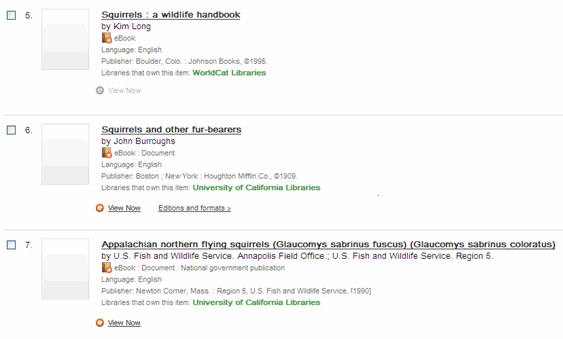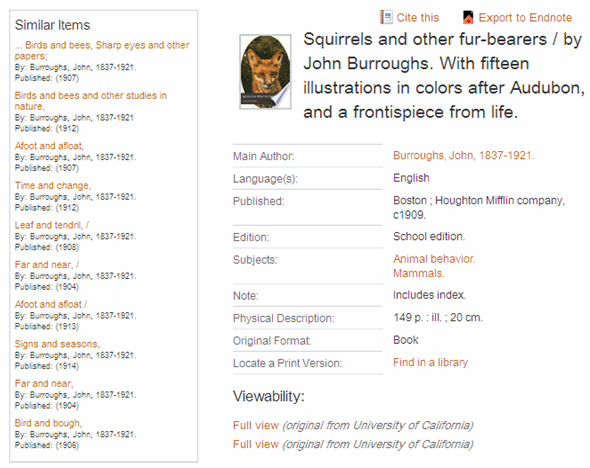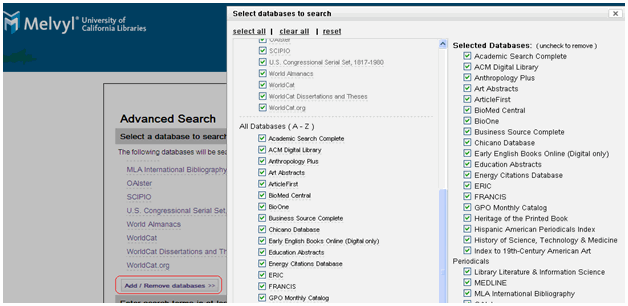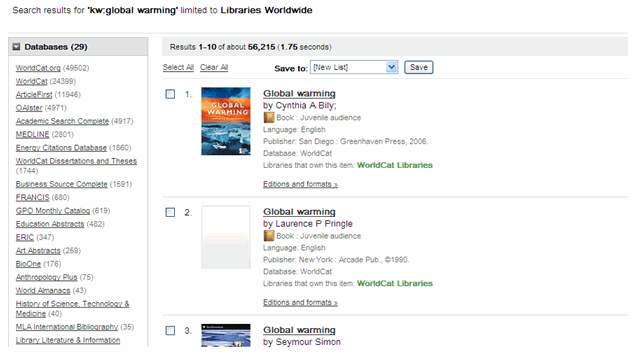Major Melvyl Enhancements Coming in January
Two exciting new features enhancing Melvyl will be turned on in Melvyl beginning this January: View Now and Central Index. Two task groups appointed by and reporting to the UC Heads of Public Services (HOPS) recommended that these features be activated after trying out aspects of these features in test versions of Melvyl. HOPS recommended to the new Melvyl Advisory Group (MAG) that these be activated in a pilot phase from January through June 2012.
What do the features do? View Now
The “View Now” link on the search results page enables users to identify and connect to full text books and documents. The feature will be turned on for freely available content in Melvyl. When an item such as a HathiTrust full text book is available, Melvyl users will see an active “View Now” link on the search results page, without needing to go to the detailed record. If full text is NOT available, the link will be grayed out. This is a welcome addition to users of HathiTrust materials especially.
When the active View Now link is selected, one or more links appear leading to the full text item:
That link leads to the item itself:
In addition to HathiTrust materials, the View Now links will be activated for free resources in the following categories: .gov/.edu documents and Internet Archive/Project Gutenberg items.
Central Index: What’s it all about?
| Academic Search Complete | Chicano Database |
| ACM Digital Library | Early English Books Online (Digital only) |
| Anthropology Plus | Education Abstracts |
| Art Abstracts | Energy Citations Database |
| ArticleFirst | ERIC |
| BioMed Central | FRANCIS |
| BioOne | GPO Monthly Catalog |
| Business Source Complete | Heritage of the Printed Book |
| Hispanic American Periodicals Index (HAPI) | SCIPIO |
| History of Science, Technology & Medicine | U.S. Congressional Serial Set, 1817-1980 |
| Index to 19th-Century American Art Periodicals | World Almanacs |
| Library Literature & Information Science | WorldCat |
| MEDLINE | WorldCat Dissertations and Theses WorldCat.org |
| MLA International Bibliography | WorldCat.org |
| OAIster |
Since OCLC moves databases in and out of Central Index, the final list may be slightly different when we go live. Only indexes to which all UC campuses subscribe—known as Tier 1 indexes—were considered for activation during this pilot period, through June 2012. Nor were indexes not in the Central Index itself, and which required a Z39.50 search, considered for the pilot. These might have had a negative impact on performance.
Individual users will be able to select and deselect databases via the Advanced Search screen; the default is to search all databases that have been activated.
As in all metasearch systems, the number of search results returned via the native database interface and in the Melvyl database will vary. The native interface offers more granularity in searching than does Melvyl, which is searching many different databases at once, often with different searchable indexes. Within Melvyl, the lowest common denominator will be searched.
Books default to the top of search results in spite of the number of articles returned. With items in the Central Index activated, teaching users to pay attention to the left sidebar facets will become increasingly important. The facets will display the number of items returned in each database, as well as which databases returned some or zero results. Reference and Instruction librarians may take this as an opportunity to lead users to the native interfaces when appropriate.
Activating this feature will be performed manually by CDL staff in early January, so that at times, some campuses will display the new interface, while others may not yet have it turned on. The feature will be completely in place by January 9.
How can I learn more?
The original task groups are working on documentation for the new features, to be ready in early January. Webinars are also planned for the weeks of January 9 and January 16.





